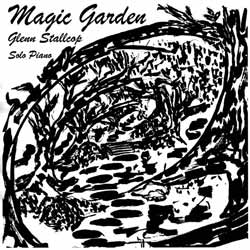|
Click here to return to the main site. Classical Music Review
Composer Glenn Stallcop's latest album of improvised piano music was born out of the realisation that his thoughts and hopes about life, happiness, his career, and many other things have turned out to be innocent fantasy. This latest album explores innocence through the metaphor of a magic garden. From the Garden of Eden to the “Primrose Path”... While it's not important to know the story behind each piece, Stallcop offers a handy guide as to the inspiration between all 7 pieces (42 min, 42 sec): 'Strolling' - The joys of a garden are in the details. A big picture doesn’t do it. The opening track explores these little intricacies as it works its way in deeper and deeper. At the end, it realizes that it doesn’t know where it is. 'To the Right' - This track and 'To the Left' start in the same place but go in different directions. The piece actually works its way back to the opening chord several times in the interim, but it’s where it goes in between that is the most interesting. 'Intermezzo No. 1' - What distinguishes this intermezzo is how it proceeds. It uses an idea from Japanese oral poetry called chained verse, where new verses (or in music, phrases) borrow something from the preceding verse (phrase) to create a new idea. This can make for subtle changes or wholesale shifts, depending on the idea and inspiration. The Japanese used to use haiku and other syllabic poetry forms, and would chain them together at parties, with a different person inventing each verse. It would be like taking turns singing improvised verses to “Frankie and Johnny,” and often just as racy. 'Oven Mitt' - "All pianists sometimes sound like they forgot to take their gloves off. On this track, it sounds like maybe I forgot to take off an oven mitt". 'Bluebells' - Bluebells chime in a magic garden. 'To the Left' - We return to where we started in 'To the Right', but it’s not the same. Awareness is not sin, but it does take the sheen off a little bit. 'You Can Never Return' - Innocence, like ignorance, may indeed be bliss, but once it is revealed, it can never be reacquired. Paradise Lost is usually more instructive than harmful, however, and there are many other gardens to explore. For those of you who have been following Stallcop's output over the years, Magic Garden represents a more mellow, laid back aspect to his composing and performing. I'd argue that it's his most intimate and revealing album to date. 9 Darren Rea |
|---|
